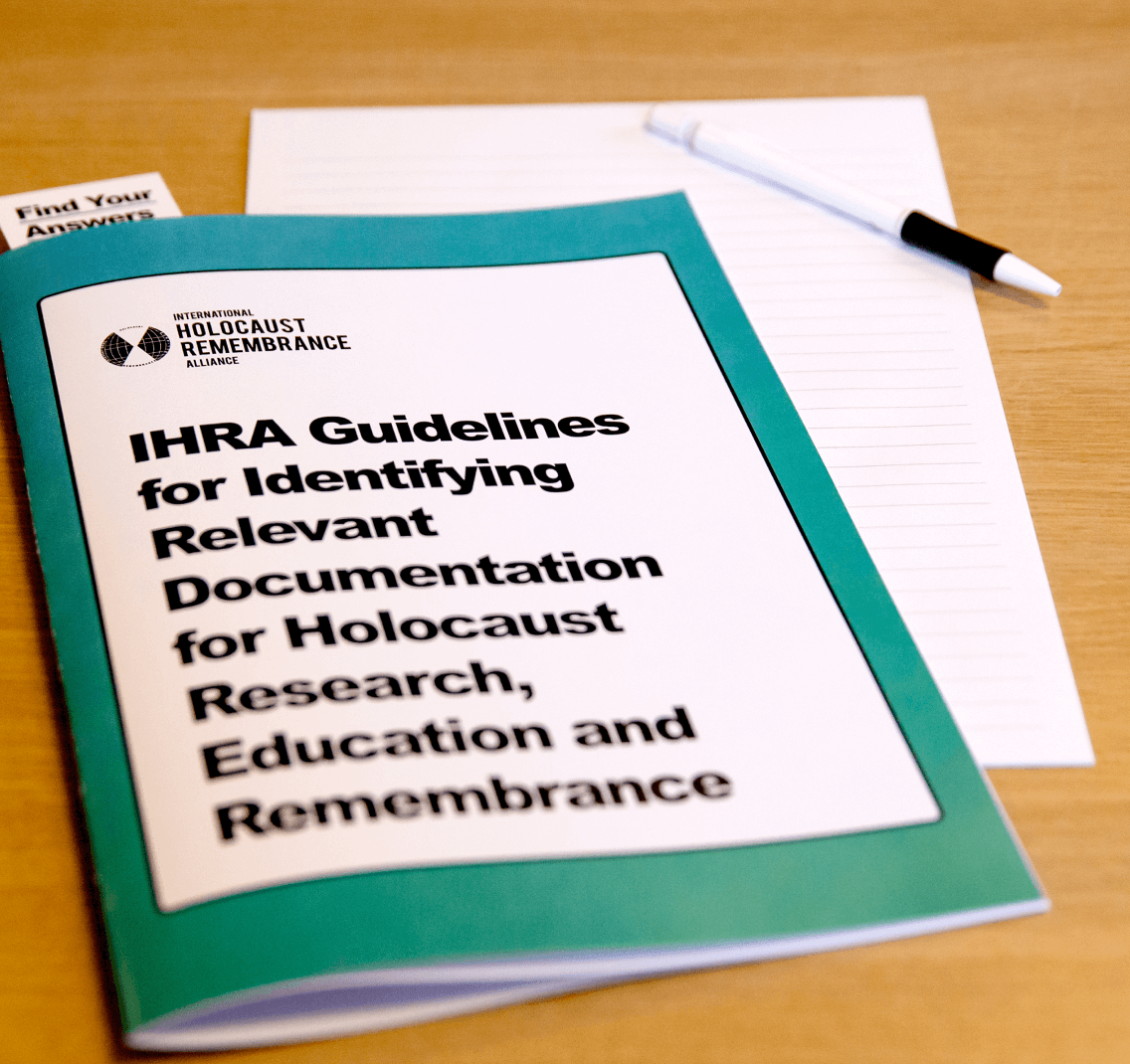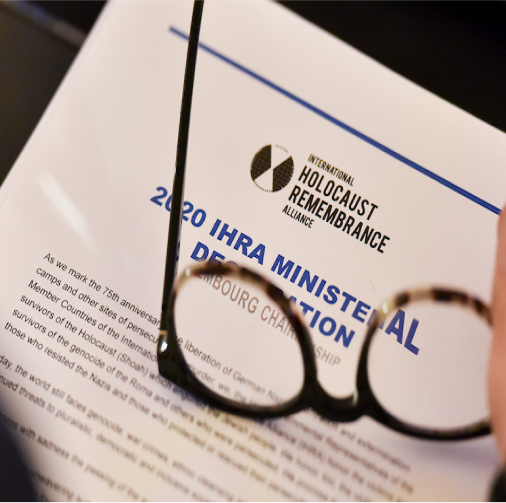
See all countries
- Argentina
- Australia
- Austria
- Belgium
- Bulgaria
- Canada
- Croatia
- Czech Republic
- Denmark
- Estonia
- Finland
- France
- Germany
- Greece
- Hungary
- Ireland
- Israel
- Italy
- Latvia
- Lithuania
- Luxembourg
- Netherlands
- North Macedonia
- Norway
- Poland
- Portugal
- Romania
- Serbia
- Slovakia
- Slovenia
- Spain
- Sweden
- Switzerland
- United Kingdom
- United States of America
Joined the IHRA
2011
International Holocaust Remembrance Day
27 January
Jackie O’Halloran (Department of Foreign Affairs) – Head of Delegation
Claire Williams (Department of Foreign Affairs) – Deputy Head of Delegation
Yvonne Altman O’Connor (Irish Jewish Museum) – Museums and Memorials Working Group
Lynn Jackson (Holocaust Education Ireland) – Education Working Group
Melanie Brown (Holocaust Education Trust of Ireland) – Academic Working Group
On joining the IHRA, Ireland established the ‘Standing Committee on Holocaust Education, Research and Remembrance’, which consists of governmental representatives, the ‘Holocaust Education Trust Ireland’ (HETI), the Irish Jewish Museum, and academics. The government has worked closely with HETI and other organizations to promote Holocaust education and awareness through teacher education programs, schools’ initiatives such as the ‘Crocus Project’, and the ‘National Holocaust Memorial Day’ commemoration. The ‘Certificate in Holocaust Education’, awarded by the Herzog Centre at Trinity College Dublin, provides teachers with continuous professional development.
Holocaust education, remembrance, and research in Ireland
All IHRA Member Countries are asked to complete a basic questionnaire with key facts about the state of Holocaust education, remembrance, and research in their country. The answers to the questionnaire, and to the Country Report, if available, are provided by the national delegations, who are also responsible for keeping the information up to date.
• “Countering Contemporary Antisemitism and Other Forms of Racism Online and Offline”
Delivered by Taoiseach Micheál Martin for the Malmö International Forum on Holocaust Remembrance and Combating Antisemitism, on the theme of “Remember ReACT” on 13 October 2021.
Link: gov.ie – Countering Contemporary Antisemitism and Other Forms of Racism Online and Offline (www.gov.ie)
• “Speech on National Holocaust Memorial Day”
Delivered by President Michael D Higgins for National Holocaust Memorial Day on 30 January 2022.
Link: Media Library | Speeches | President of Ireland
• Holocaust Denial, UN General Assembly resolution, 13 January 2022, co-sponsored by Ireland
Link: N2223012.pdf (un.org)
The Criminal Justice (Hate Crime) Bill 2021 creates an offence of inciting hatred against another person or group due to characteristics including race, religion, ethnic or national origin. It will also create a new offence of denying, or grossly trivialising, crimes of genocide, including Holocaust denial, based on the definition of genocide from the UN Convention on the Prevention and Punishment of the Crime of Genocide.
A new National Action Plan Against Racism is in development and will include measures to combat antisemitism, antigypsyism and other forms of racism. The Anti-Racism Committee is expected to submit their draft Action Plan by June 2022. The Plan is expected to be adopted before the end of 2022.
A National Equality Data Strategy is expected to be in place by 2023.
Ireland has developed revised educational curricula and teacher training on the Holocaust that contributes to promoting overall equality and diversity.
The National Traveller and Roma Inclusion Strategy, 2017-2021.pdf (justice.ie) sets out key initiatives and developments including 1. State recognition of Travellers as an ethnic group of the Irish nation; 2. investment by the State in community-based support mechanisms to ensure greater retention of Traveller and Roma children and youths in the education system; 3. increased funding to be invested by the State to promote knowledge of, and pride in, Traveller culture and heritage; 4. in consultation with Traveller representatives, a culturally appropriate initiative will be designed to address feuding in the community; 5. a new system of ethnic identifiers will be developed across the public sector to help to track progress and/or challenges for the Traveller and Roma communities in Ireland; and 6. reinvigorated efforts by the State to ensure that Travellers and Roma interact fully with the public health sector in order to address some of the underlying health-related challenges facing those communities.
Ireland hosts an annual National Holocaust Memorial Day on or near 27 January (the anniversary of the date of the liberation of Auschwitz-Birkenau). The event is organised by the Holocaust Education Trust Ireland (HETI), in association with Dublin City Council and the Department of Children, Equality, Disability, Integration and Youth. The President and Taoiseach have given the keynote address at several annual ceremonies (including the Taoiseach in 2021 and 2018 and the President in 2022, 2020 and 2019). Many of Ireland’s Embassies and Consulates participate in Holocaust remembrance events around the globe. In 2022, this included Consulate Sao Paulo, Embassies Berlin, Bratislava, Bucharest, Budapest, Buenos Aires, Cairo, London, Nicosia, Prague, Riga, Tallinn, Vilnius, Warsaw and Permanent Missions Geneva and New York.
The focus of the Department of Education is to support Holocaust education and commemoration and also to link it to wider issues, such as challenging antisemitism and racism in Ireland. The designation of ‘special core status’ to Junior Cycle History means that all junior cycle (lower secondary) students will explore the significance of genocide, including the causes, course and consequences of the Holocaust.
Schools can also opt to offer Jewish Studies as part of their Junior Cycle curriculum. This new specification was introduced to first year students in September 2019. Junior Cycle Jewish Studies aims to enable students to broaden their historical, literary, cultural and religious knowledge and understanding, to foster an understanding of and respect for Judaism and its contribution to the western world, and to promote some of the skills and attitudes that are important for intercultural living. Students in senior cycle (upper secondary), through engagement with subjects such as Politics and Society and History, explore in further detail the Holocaust and other genocides, explore human rights education and countering racism.
In September 2021, an optional module in Holocaust Studies was developed for students taking the Transition Year (a year between lower and upper secondary, where students can have a range of learning experiences without the pressure of written exams.) Funded by the Teacher Education Section of the Department of Education, the Holocaust Education Trust Ireland (HETI) in collaboration with the National Council for Curriculum and Assessment, and the Department of Education History teams of both the Junior Cycle for Teachers and the Professional Development Services for Teachers, has developed a ten module course that schools can offer to Transition Year students. Teachers have the option to select particular modules and modify the course to suit time available to the school and their particular students.
The Department of Education Teacher Education Section provides funding for the Holocaust Education Trust Ireland (HETI) for a three year period, 2020-2022, to provide a programme of Continuous Professional Development (CPD) for post primary teachers, as well as a Transition Year course, Outreach Education and the Crocus Project. For example, HETI have developed a two hour CPD course for post- primary teachers, ‘The Holocaust Narrative’, which is available through the Education Centre network across the country. This course was launched in February 2021 and is suitable for teachers across a range of subjects including History, Politics and Society, Religion and English.
On Scoilnet, the Department of Education’s official portal for Irish education, students and teachers can access a wide range of resources including personal testimonies from Holocaust survivors. In addition, survivors of the Holocaust speak to students at school visits throughout the school year. To accompany a Holocaust survivor speaking in schools, HETI provides every student with a Holocaust Memorial Day booklet to take home and in this way, Holocaust awareness is heightened among the households of Ireland. Second and Third Generation survivors (children and grandchildren of Holocaust survivors), now participate in this programme, sharing their experiences in schools.
• Holocaust Education Trust Ireland 2005
Educational organisation providing teacher training,lectures/seminars, survivor school visits, commemorations, exhibits
• Irish Jewish Museum 1984
Non-profit museum incorporating former synagogue and Irish-related Holocaust section. The museum holds regular talks, events and exhibitions about the Holocaust and includes Holocaust awareness in their education programme with visiting schools. During the pause in onsite events due to the COVID-19 pandemic, the museum took the opportunity to expand their website. www.Jewishmuseum.ie)
Both are listed in the IHRA Overview of Holocaust-related Organisations.
• The National Archives of Ireland
Includes Central Registry files from the Department of the Taoiseach and its predecessor, commencing in 1922, and Central Registry files from the Department of Justice from 1934 onwards.
• Dublin City Library and Archive
Includes Archives of Irish Jews 1650 – 2015.
Both are listed in the EHRI Portal.
HETI seeks funding from government departments, cultural bodies, corporate sponsors, religious bodies, philanthropic and funding organisations, as well as private individuals.
Statement on the Responsibility to Protect on behalf of the Group of Friends of Responsibility to Protect, 17 May 2021, co-signed by Ireland
Link: Statement delivered on behalf of members of the Group of Friends of R2P at the 2021 UN General Assembly Debate on R2P – Global Centre for the Responsibility to Protect (globalr2p.org)






